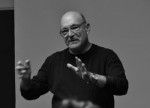Seeger’s Music Spurs Social Change

The likes of Woody Guthrie, Bob Dylan and others are frequently associated with the rise of folk songs and political movements, but as about 20 students and faculty discovered last week, the origins of the successes of folk music lie with a lesser known artist, Pete Seeger.
Professor of Sociology Emeritus at the University of California Santa Barbara (UCSB) Richard Flacks presented a lecture on this subject, titled “Pete Seeger and the Power of Song,” on Thursday, October 22 to students and faculty in Alumni Hall. Flacks has studied, taught and written about social movements, music, politics and social change. During the lecture he highlighted Seeger’s role as a pivotal individual in the establishment of music to create social change, though Seeger goes relatively unnoticed in history.
Professor of Sociology Rhonda Levine who taught a course last Spring on “Power, Politics and Social Change” said that many of her students were already familiar with Flacks’ work and invited him to come speak at Colgate.
“I knew that Professor Flacks was going to be in the area and thought it would be a wonderful opportunity to have him speak at Colgate on his work on Pete Seeger and the role of music in social movements,” Levine said.
Flacks, who is a self-identified Seeger fan and taught a course at UCSB similar to Levine’s focusing on the role of music, said he was shocked at how unknown Seeger was to younger generations.
“I was amazed, in teaching, how few students knew about Pete Seeger,” Flacks said.
He emphasized that this was part of the reason for presenting the lecture, discussing the important role Seeger played in establishing song, particularly folk songs, as a means of affecting social change. During the lecture, Flacks named several popular songs, including “This Land is Your Land,” “We Shall Overcome” and “The Lion Sleeps Tonight,” that were exposed to the American public or written by Pete Seeger but made famous by other individuals.
Flacks discussed the prevalence of other singers who played similar roles in social change, but was sure to emphasize that without Seeger, none of the others would be as well known as they are today.
“There would be no Woody Guthrie as a legend had there been no Seeger to create that legend,” Flacks said.
Much of the lecture, which included multimedia clips from various Seeger and Seeger-inspired concerts, was focused on the role of music, particularly that which Seeger used to influence social movements.
Senior Becky Blake said the importance of music in social movements was what struck her most in Flacks’s lecture.
“I think it was particularly interesting how Flacks pointed out that with every social movement there is music,” Blake said. “I’ve never thought much about the power of music, but Flacks was convincing in his argument of how powerful and effective it truly can be in motivating or unifying a people.”
Levine felt that she also learned much from Flack’s talk.
“I think those of us in attendance gained a much greater appreciation of the role Pete Seeger played in creating not only a particular type of folk music that was democratic and participatory in nature, but also played a significant role in forging a sense of social identity in progressive social movements,” Levine said.






